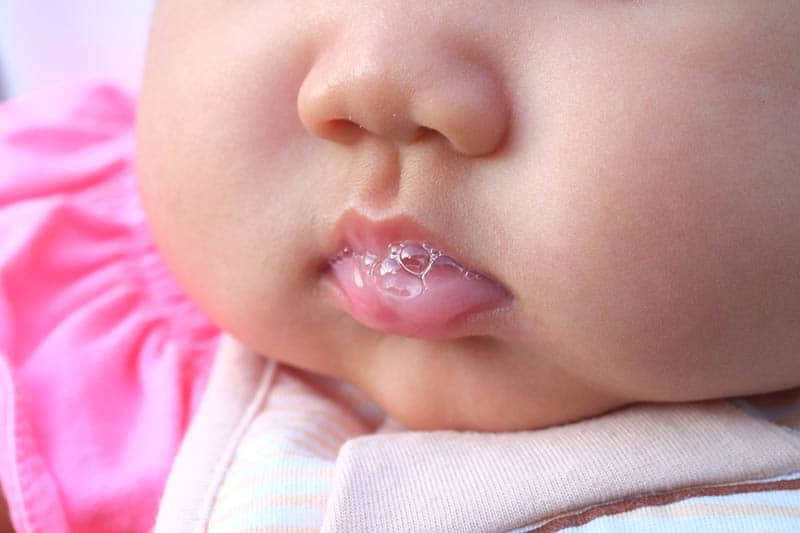During his early weeks of childhood, you may notice your baby spit up clear liquids at times. While it is fairly uncommon, I assure you that it’s rarely ever a cause for alarm.
Babies usually spit up clear liquid if they’ve been overfed a bit or if they’re suffering from a cold, among other things.
The act of spitting up itself, though, isn’t a cause for worry for parents new or experienced. It’s more of a warning system that lets you know you’re doing something wrong.
What are you doing wrong? Well, you might be using the wrong-sized bottle for your baby, feeding them too much, or it might mean the baby is getting sick.
That said, the spit up will almost never come alone and will usually be mixed with regurgitated baby formula, curdled breast milk and other stomach contents.
Only a few problems, like GERD (Gastroesophageal Reflux Disease) and Pyloric Stenosis, are something you’ll need to call a pediatrician for as they can cause a number of severe health issues for your child.
With that said, I’m here to help you understand everything that might cause your baby to spit up, so let’s get to it.
The 6 Reasons Why Your Baby Spits Up In The First Place
As I’ve already mentioned, there are a few rather common causes of spit ups in babies, but there are also several others that are a bit more unusual that you should keep an eye out for.
1. Spit ups as a normal process in younger babies

There’s a muscle that sits between the esophagus and the rest of the digestive system which helps keep stomach contents down so they can properly digest.
This muscle, called the lower esophageal sphincter, doesn’t develop in babies until they’re around 11-12 months of age and is the main reason why your little one spits up so often during that period – some of the food simply comes back up.
It’s something to be expected and is one of the main reasons why burping your child after a feed is so important.
Burping helps deliver the spit-up in an expected fashion and gives you the chance to have a burp cloth ready rather than having to clean the spit up off the carpet afterwards.
Tying onto that, if you hear your baby burp after finishing with the breast or the baby bottle, a spit up might not be too far off – so be on the lookout for that warning sign.
Though, as I’ve said, it’s not really a problem even if it’s a common occurrence. It’s just their digestive system adapting and evolving into a more mature one.
2. Excess saliva from teething

The process of teething naturally occurs in all children’s development processes and it’s during this process that lip-smacking and spit ups might happen as well.
It’s mainly to do with the fact that the inside of your little one’s mouth is bound to get some injuries, such as some cuts and bruises.
Their body reacts to this by producing more saliva to help numb the pain and to allow the mouth to heal.
The problem arises when there’s too much saliva to swallow.
Your child starts gagging on it, only for the throat muscles to contract and spit the saliva back up alongside any food he may have eaten recently.
Again, not really a big cause for concern – it’s just their body learning to adapt to these situations and is part of the process of growing up.
3. Overfeeding the baby

Now, this was the reason why I was calling spit ups a warning sign, one of them anyway.
It’s when the parents end up overfeeding the baby, overwhelming the capacity of the baby’s stomach. The food has nowhere to go but back up, usually changing spitting up into full-on vomiting.
It’s a nasty process for the baby as their stomach muscles start contracting and they have to forcefully eject the contents of their stomach in large amounts.
It’s also an equally nasty process to clean it up.
It might not always be your fault, either, since our precious babies can get a bit greedy sometimes and insist on staying on the breast for longer than they should.
This, of course, leads to an upset tummy and a nasty return of everything they greedily consumed in the breastfeeding period.
While normally not a serious problem if it only happens occasionally, it can pose an alarming issue if it starts occurring frequently enough to impact your baby’s weight gain and overall health.
4. Any sort of cold or illness

Just as the baby’s esophageal muscle hasn’t developed to keep his stomach contents down yet, so too his reflex for coughing up mucus or blowing snot out his nose needs more time.
This is why when your little one ends up sick.
They are more prone to spitting up as they swallow most of the mucus, filling their stomach with the icky stuff and essentially repeating the first reason – albeit with something non-food related.
This form of spit up can help to spot signs of illness in your child without having to take their temperature every waking minute.
The clear liquid in this case is the mucus with a bit of snot added into the mix.
So, if you spot the spit-up in this manner, it’s more than likely that your child has contracted something.
Their newborn immunities don’t last long, only about half a year, after which colds are going to be frequent until their immune system develops properly.
Naturally, there are points here that, when crossed, should be a cause for concern. For example, if your baby ends up vomiting or spitting up alongside a heavy fever of around 100°F or heavy diarrhea.
The fever is the more obvious of the two signs as kids can’t withstand a body temperature much higher since they’re still fragile compared to fully grown adults.
Plus, as touched upon earlier, their immune system isn’t as developed either, meaning they can’t cope with those kinds of temperatures.
As for the diarrhea and vomit combo – apart from being your nightmare, it can also cause problems for your child because the diarrhea alone is bound to empty out all of the stomach’s contents.
Then, all that’s left for the baby to vomit up are the clear stomach fluids that need to remain inside otherwise the stomach risks damage from stomach acid.
If the mucus-laden stomach lining is thinned due to vomiting, this is more likely to happen.
Should you see your baby experiencing any of these symptoms, don’t hesitate to call your child’s pediatrician for an appointment or immediate help if the situation is particularly bad.
There could be some underlying problems with your child’s digestive system or it may have been caused by some sort of allergic reaction.
The pediatrician is there to help you suss it out and figure out exactly what it is that’s ailing your child.
5. Pyloric stenosis
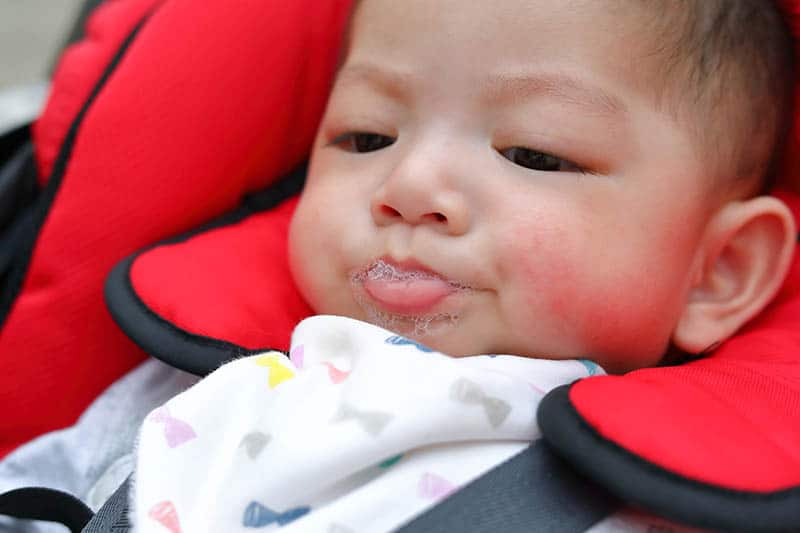
This is undoubtedly a new term for many of you so let me explain exactly what this uncommon condition is.
It’s named after a muscle that sits between the stomach and the small intestine, acting as a sort of barrier that expands and contracts to let food through in a timely manner. It’s known as the pyloric sphincter.
Now, normally this wouldn’t cause an issue, but the problem comes when said muscle is narrower and denser than normal, making it act as if it was perpetually contracted and not allowing any food to come through.
Meanwhile, the stomach still tries to push the food down the closed chute, leading to a lot of muscular contractions that grow more and more intense until it reaches a critical point.
That point is when your baby starts projectile vomiting all over the place due to the sheer amount of pressure exerted by your little one’s stomach muscles, propelling the vomit out of their mouth.
Apart from the increased vomit velocity, you’ll notice bits of milk that look like cheese curds or some cloudy spots in the clear liquid from the leftover undigested breast milk.
This is to be expected, given that it was unable to go down the right way.
This is one of the more serious conditions and, if left untreated, can and will leave your baby malnourished and dehydrated.
You’ll also notice a slowing in weight gain, or even outright weight loss, which can cause issues in their development – something you want to avoid at any cost.
The other issue, in this case, is that despite throwing all of that up, your baby is still going to feel hungry and they’ll want to replace the lost contents, making them cranky and fussy, only adding fuel to the already problematic fire.
Babies don’t realize that they have a problem that simply won’t let them push the food back down the proper way.
Luckily, this isn’t a permanent condition and a safe surgical procedure exists that’ll remedy the issue and allow your child to go back to normal and enjoy food again.
6. Gastroesophageal reflux disease (GERD)
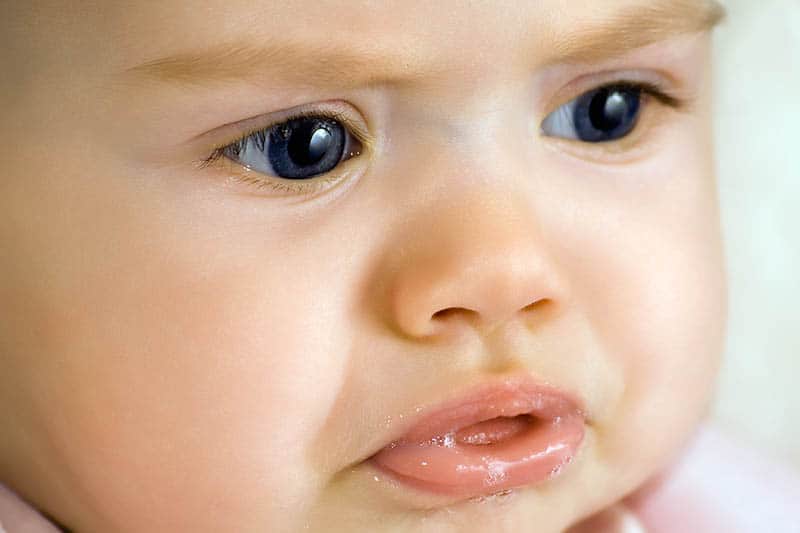
And the final reason and one of the more serious issues is Gastroesophageal reflux disease – or GERD for short.
While basic spitting up is known as infant reflux and isn’t dangerous in most cases, GERD is a different beast altogether as it involves a more violent form of spitting up, called acid reflux.
This is when a dose of stomach acid comes back up the esophagus on top of the food they’ve consumed and ends up burning their little throats.
You may have experienced this during your lifetime as well, after a coffee or something similar. You’ll have felt that horrid burn in your throat when something didn’t want to stay down.
This is essentially a form of that.
The telltale signs of this are frequent yellow spit-ups, vomiting, a lack of appetite, weight loss and fussiness due to the pain your baby feels in his throat.
Depending on the severity of the GERD, treatments may include simple things like feeding your child more frequently but in smaller amounts to allow their stomach to process the milk more easily.
If the cause is an intolerance or an allergic reaction, an effective solution might be to change the type of baby formula you’re feeding your baby or to cut out any and all dairy products in case of a lactose intolerance.
Formulas like Nutramigen or Alimentum are often recommended in this case. For more severe allergies, many parents opt for Neocate or Elecare.
If you’re worried about your little one losing interest in the nipple from not having the taste of breast milk in his mouth, get some formula that tastes just like mother’s milk to combat this.
But, if the issue is too severe, you might have to resort to baby medicine or even surgery to help alleviate the symptoms for the time being.
Thankfully, it isn’t a permanent issue and should fix itself by your child’s first birthday, after which he’ll be free to enjoy solid foods properly.
How To Avoid Having Your Baby Spit Up Clear Liquid
Now that you know the reasons why this phenomenon happens, here are a few ways you can minimize the chances of any of them occurring.
1. Feed the baby in an upright position

This is the easiest method to follow as it just requires a bit of a change in your routine.
You should always feed your child in an upright position to let them control the pace of their feeding, rather than being surprised by a torrent of milk that they’ll struggle with, leading to one of these issues.
Once the feed is done, make sure to keep your little one in a similar position for a short while – 20 to 30 minutes should suffice.
This is to let the food settle properly and to give it time to be digested while gravity helps keep it down ever so slightly.
2. Pace your feedings

By this, I mean that you should be careful how much you feed your child and to keep to a strict schedule. Don’t overfeed them and don’t let them overfeed themselves by drinking more than necessary.
This might require a bit of trial and error but is bound to show the best results once you’ve perfected it.
3. Don’t let the baby lie on his stomach

Added pressure to the stomach is not helpful if your child already has a sensitive tummy or if they’ve just eaten. Should the baby be tired after a feed, always make sure that they lie on their back.
Doing this isn’t just down to the spit up issue, it’s also to prevent sudden infant death syndrome – or SIDS for short – because your baby lacks the ability to reposition themselves should they find themselves suffocating.
A morbid detail, to be sure, but one that’s necessary for you to be informed about so as to not make a grave mistake.
4. Monitor the baby’s food as well as your own
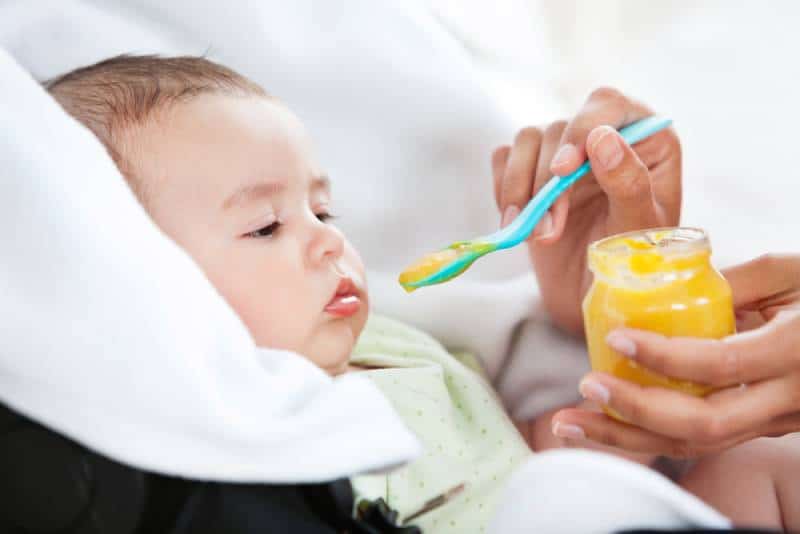
It’s not just what the baby eats, but it’s what you eat or take in by proxy.
For instance, there’s a reason why you shouldn’t be taking certain medication, eating spicy food, or any food the baby might be allergic to.
That’s because some parts of all of these things end up in breast milk and will transfer to the baby, causing an unwanted stomach issue that could lead to the spitting up in the first place, clear or otherwise.
5. Check their diaper size

While this one may sound a bit far-fetched, tight clothing (or diapers in the case of babies) applies unwanted pressure on the stomach and may be a possible cause of your baby spitting up clear liquid.
Make sure that the elastic band isn’t too tight around their waist and that they’re comfortable. And make sure to choose the right diaper brand, especially if your baby has sensitive skin.
6. Trapped air is the enemy
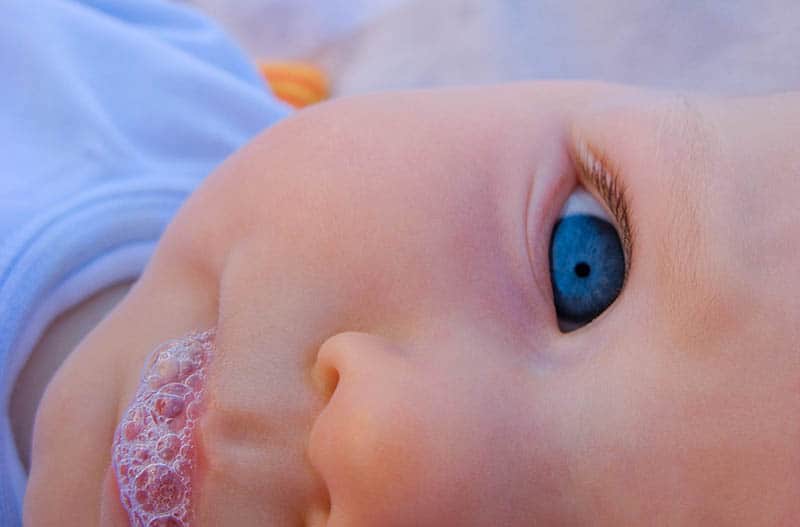
During feeding sessions, your child may end up swallowing a bit more air than usual. This can cause discomfort like bloating and cramps, as well as spit ups and general fussiness.
In order to prevent this from being an issue, burping your baby after every meal should become common practice.
It’ll help your baby feel better and it’ll keep you from having to deal with bigger problems down the line.
In Conclusion

Should your baby spit up clear liquid at any point during his early stages of development, you shouldn’t panic as most of the time, as you can see, it isn’t really detrimental to your child.
Spit ups are part of the process and are bound to happen regardless of what you do.
It’s the nastier ones like GERD and pyloric stenosis that you should be on the lookout for in order to fix early so your baby doesn’t have to suffer any ill effects and so he can enjoy food like the rest of us.
Should you have any more questions related to the topic, feel free to send me an e-mail and I’ll try to answer it to the best of my ability.
Until next time, mammas.
Like this post? Please share or pin it for later. You can also stay in the loop and follow us on Facebook, Instagram and Pinterest.
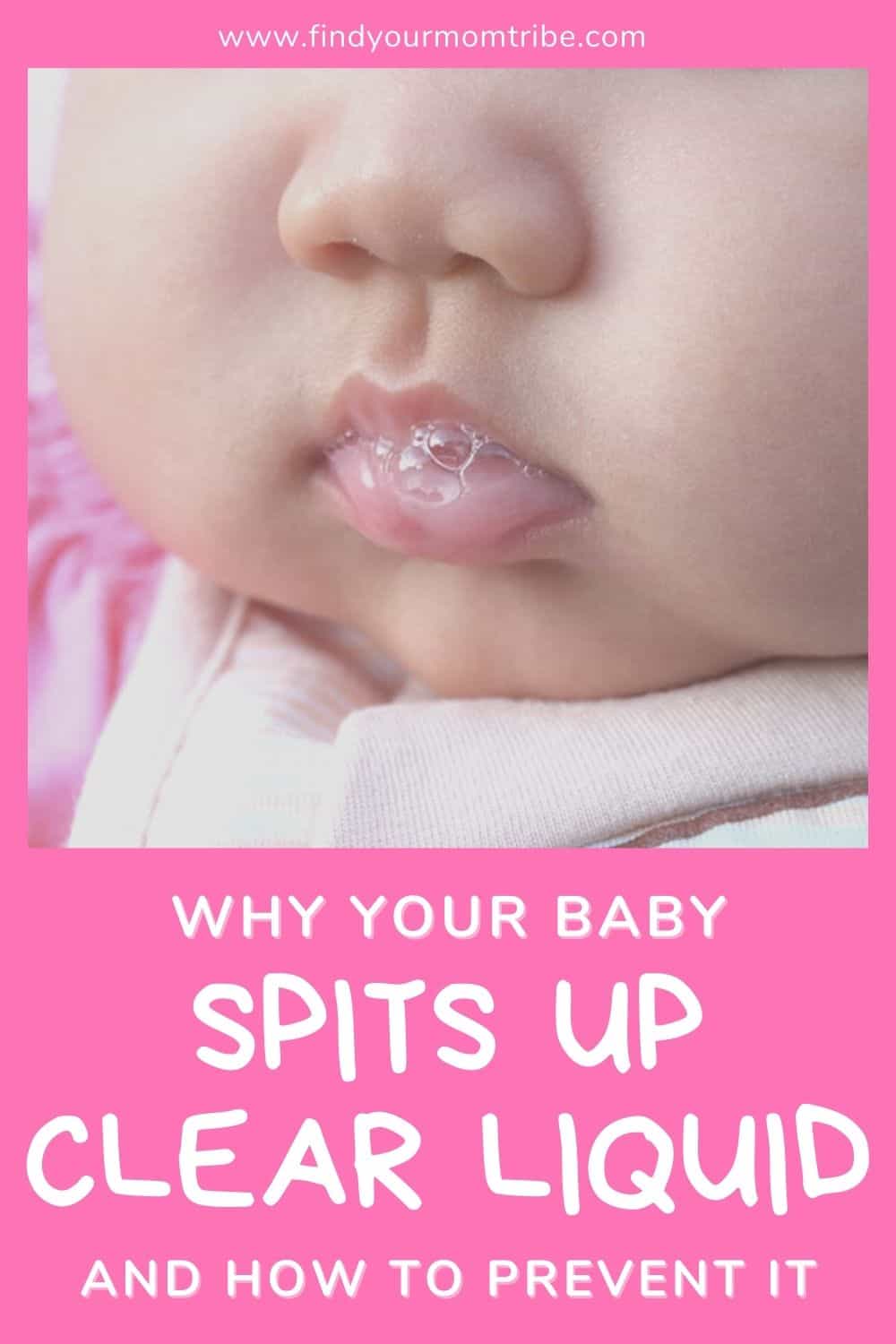
This post contains affiliate links. Please see our full disclosure or more info.

